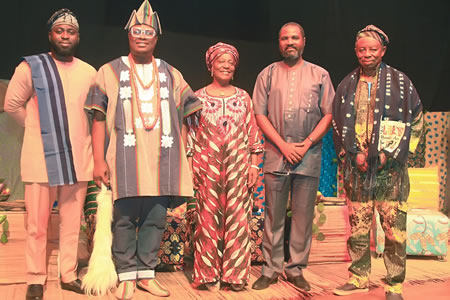YOU would think you were back in time, in the old Oyo Empire. The attires, hairstyles, meals and drinks were retro in conformity with the theme, ‘Back to Oyo’. There was, among others, eko (cold pap) and palm-wine as the gastronomic needs of guests were catered to at the foyer before the main event started inside the Agip Hall of the MUSON Centre, Onikan, Lagos last Sunday.
The occasion was the launch of Tunde Leye’s historical novel, ‘Afonja The Rise’, the author’s fascinating retelling of the story of the Aare Ona Kakanfofo who most mainstream accounts blame for the decline of the Oyo Empire.
The TV presenter, Titi Oyinsan, who looked sharp in her female dashiki and matching pencil trouser, anchored the event and did an excellent job. By way of whetting people’s appetite, especially those that had not read the novel which animates history and gives a different perspective on Afonja’s role in the demise of the Oyo Empire, broadcast journalist, Bella Rose Okojie read an excerpt from it.
Spoken word artist, Rez d Poet (Adebola Afolabi) accompanied on the flute by Awoko was up next after her reading. He reiterated the importance of knowing one’s identity in his performance.Because of the historical nature of ‘Afonja The Rise’, there was also a panel discussion on the book. A lawyer and poet, Oladimeji Ojo, moderated the session which featured renowned cinematographer and producer, Tunde Kelani; a retired Chief History lecturer at the Adeniran Ogunsanya College of Education, Mrs Elizabeth Ajayi and host of Channels Book Club, Kunle Kasumu. The illuminating discussion affirmed the importance of cultural rebirth through proper learning of history and culture.
Responding to moderator’s question seeking to know if slavery was part of Yoruba culture before colonialism, Mrs Ajayi, who is also a doctoral candidate at the University of Ibadan, said yes but that it was different from the Trans-Atlantic Slave Trade. She explained that: “In an agrarian community, labour was essential, but the household constituted the major source. Men had several wives to have many children to work on the farms. Slaves were part of the labour force, but domestic slavery was different from Trans-Atlantic Slave Trade. The way the Yoruba treated their slaves was different from the Trans-Atlantic Slavery. There’s a consideration that you give to your slave; a slave that has been loyal can become almost part of the household. The Yoruba did not treat slaves like they were during the Trans-Atlantic Slave Trade.”
Asked what made the kingship institution experienced a decline, Kasumu said it was the 1861 annexation of Lagos by the British. “When the British came, they took over the people; they took over our culture. That’s how the British operated. Once colonialism happened, there was a loss of culture. They used Lagos as leverage to take over the surrounding kingdoms. And once that happened, the structures, the culture all went away. The Trans- Atlantic Slave Trade story is not told enough. Nobody talks about Nigeria. Only a few people realise that 23 per cent of those taken away were from this part of Africa. Some of these structures still exist, but they are not as powerful as they used to be,” he said.
Contributing, Kelani began by commending Leye for a job well done. “As a storyteller, it [book] is cinematic already,” he added before referring to the conference on the Alaafin of Oyo at 80 organised by the Centre for Black Culture and International Understanding (CBIU) last year. He recalled how eminent historian, Professor Toyin Falola canvassed for the study of ‘Alaafinology’ and ‘Ifaology’ in universities and other institutions of higher learning as well as Oba Lamidi Adeyemi’s address at the occasion. The Alaafin told them about separation of powers and checks and balances in old Oyo. significant women in work, noting that they remain powers behind the throne in modern times. “In power politics, women have always been behind the scene manipulating the leaders.”







